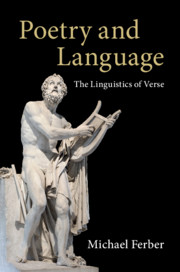Book contents
- Poetry and Language
- Poetry and Language
- Copyright page
- Dedication
- Contents
- Illustrations
- Acknowledgments
- Chapter One Introduction
- Chapter Two Meter and the Syllable
- Chapter Three Rhyme
- Chapter Four Onomatopoeia and Sound Symbolism
- Chapter Five Unusual Word Order and Other Syntactic Quirks in Poetry
- Chapter Six The Meaning of a Poem
- Chapter Seven Metaphor
- Chapter Eight Translating Poetry
- Appendix Quantity and Pitch in Greek Verse
- Works Cited
- Index
Chapter Seven - Metaphor
Published online by Cambridge University Press: 02 October 2019
- Poetry and Language
- Poetry and Language
- Copyright page
- Dedication
- Contents
- Illustrations
- Acknowledgments
- Chapter One Introduction
- Chapter Two Meter and the Syllable
- Chapter Three Rhyme
- Chapter Four Onomatopoeia and Sound Symbolism
- Chapter Five Unusual Word Order and Other Syntactic Quirks in Poetry
- Chapter Six The Meaning of a Poem
- Chapter Seven Metaphor
- Chapter Eight Translating Poetry
- Appendix Quantity and Pitch in Greek Verse
- Works Cited
- Index
Summary
Metaphor seems most at home in poetry. Many would say it provides poetry’s best and most distinctive furniture. Those two sentences each contain a metaphor, and the two metaphors are similar (poetry is a home, and has furniture in it), but the sentences are not parts of poems, as far as I know, and they even sound rather prosaic. So we cannot make a case that metaphor is the unique defining feature or common denominator of poetry, for there are poems without metaphors, or at least without any expressions that stand out as metaphors, and there is plenty of metaphor-rich prose. In fact, as Nietzsche insisted long ago, and Lakoff and Johnson and many other scholars have argued in detail in recent years, metaphors are pervasive in ordinary speech, and many of the ones that strike us in poetry are variants or extensions of the basic ones we use, usually without thinking about it, all the time. Still, most readers and writers would agree that metaphor counts as one of the characteristic features of poetry, one of the most salient of poetry’s “family resemblances.” In a “prose poem,” for example, where meter, rhyme, and even line have been abandoned, what keeps it a “poem,” many would say, is its density of figurative language, and especially metaphor.
Information
- Type
- Chapter
- Information
- Poetry and LanguageThe Linguistics of Verse, pp. 195 - 237Publisher: Cambridge University PressPrint publication year: 2019
